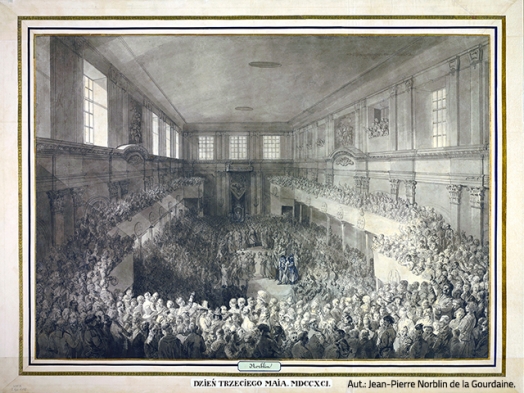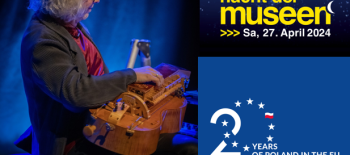Fr 03.05.2019
228. Jahrestag der Verfassung vom 3. Mai
Der Text der Verfassung vom 3. Mai 1791 wird traditionell König Stanisław II. August, Großmarschall von Litauen Ignacy Potocki und dem Priester und Philosophen Pater Hugo Kołłątaj zugeschrieben.
Die angenommene Verfassung wurde durch den politischen und sozialen Gedanken der europäischen Aufklärung sowie durch die amerikanische Verfassung von 1787 inspiriert. Die Autoren des polnischen Grundgesetzes sahen vor, dass die Regierung die Nation an die erste Stelle setzen sollte, anstatt die Interessen der wenigen zu vertreten. Das Dokument bestand aus 11 Artikeln. Der erste gewährte dem römisch-katholischen Glauben einen dominanten Status, garantierte aber gleichzeitig die Freiheit des Glaubens und der Praxis für andere Religionen. Artikel 5 sah die Gewaltenteilung in Gesetzgebung, Exekutive und Judikative vor. Ein Zweikammer-Sejm verabschiedete Gesetze, die Exekutivgewalt lag in den Händen des Königs und der Wächter der Gesetze, und die Gerichtsgewalt wurde von unabhängigen Gerichten ausgeübt.
Der Verfassungstag wurde 1919 gegründet und war bis 1940 ein Nationalfeiertag. Während des Zweiten Weltkriegs und in den Zeiten der Volksrepublik Polen war es verboten, die Verfassung vom 3. Mai zu feiern. Erst 1990 wurde der Feiertag per Gesetz wiederhergestellt.
MFA Pressestelle
228. rocznica uchwalenia Konstytucji 3 Maja
Za autorów Konstytucji 3 Maja 1791 roku uważa się króla Stanisława II Augusta, wielkiego marszałka litewskiego Ignacego Potockiego oraz ks. Hugona Kołłątaja, duchownego i filozofa.
Uchwalona konstytucja czerpała inspirację z myśli politycznej i społecznej europejskiego oświecenia oraz amerykańskiej konstytucji z 1787 roku. Twórcy polskiej ustawy zasadniczej uznawali, że rząd musi służyć dobru całego narodu, a nie interesom nielicznych. Na dokument składało się 11 artykułów. Pierwszy z nich określał religię rzymskokatolicką jako dominującą, zapewniając jednocześnie wolność wyznania i praktyk wyznawcom innych religii. Artykuł V Konstytucji dzielił władzę na ustawodawczą, wykonawczą i sądową. Dwuizbowy Sejm uchwalał prawa; władza wykonawcza miała być w rękach króla i Straży Praw; sądownicza była w ręku niezawisłych sądów.
Dzień Konstytucji ustanowiono w 1919 roku i był świętem państwowym do 1940 roku. W czasie II wojny światowej oraz w czasach Polski Ludowej obchodzenie dnia 3 Maja było zabronione. Dopiero na mocy ustawy z 6 kwietnia 1990 przywrócono to święto państwowe.
Biuro Rzecznika Prasowego MSZ
228th Anniversary of the 3 May Constitution
The text of the 3 May Constitution of 1791 is traditionally credited to King Stanisław II August, Grand Marshall of Lithuania Ignacy Potocki, and the priest and philosopher Fr. Hugo Kołłątaj.
The adopted constitution drew inspiration from the political and social thought of the European Enlightenment as well as the American Constitution of 1787. The authors of Poland’s basic law stipulated that the government was to put the nation first rather than advance the interests of the few. The document consisted of 11 articles. The first one granted dominant status to the Roman Catholic faith but at the same time guaranteed the freedom of belief and practice to other religions. Article 5 provided for the separation of powers into legislative, executive, and judicial. A two-chamber Sejm passed laws, executive power was in the hands of the king and the Guardians of the Laws, and judicial power was exercised by independent courts.
Constitution Day was established in 1919 and was a public holiday until 1940. During the Second World War and in the times of the Polish People’s Republic it was forbidden to celebrate the May 3 Constitution. It was only in 1990 that the public holiday was restored by law.
MFA Press Office.




